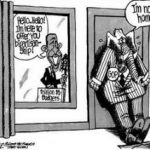 Last week, I posted a quote from Matt Bruenig, Don’t Blame Unions for Police Brutality. I didn’t realize that calling for an end of police unions was becoming a thing. Last weekend, Ross Douthat wrote, Our Police Union Problem. I will admit, I’ve never been that keen on police unions, simply because I haven’t been that keen on the police. But I nevertheless support police unions because I support workers and their rights to organize. Of course, Douthat is a complete nitwit when it comes to the issue.
Last week, I posted a quote from Matt Bruenig, Don’t Blame Unions for Police Brutality. I didn’t realize that calling for an end of police unions was becoming a thing. Last weekend, Ross Douthat wrote, Our Police Union Problem. I will admit, I’ve never been that keen on police unions, simply because I haven’t been that keen on the police. But I nevertheless support police unions because I support workers and their rights to organize. Of course, Douthat is a complete nitwit when it comes to the issue.
He started his article with the usual litany for why public sector unions are bad. For example, “[T]he government’s money is not its own, so negotiations between politicians and their employees (who are also often their political supporters) amount to a division of spoils rather than a sharing of profits.” His unstated assumption here is that taxation is theft. That’s a position that one can take, but almost no one actually buys it. He also noted that unions drive up the costs of services. But who is to say what the value of the services is? We could use slave labor for our policing. That would certainly drive the price of services down. But would that be just? Why is the compensation derived at through collective bargaining too high, while a divide-and-conquer approach is correct?
Just to show that there are no limits to his nonsense, he finished off, “Finally, union lobbying power can bias public-policy decisions toward the interests of state employees.” But private sector companies lobby the government over public policy decisions with the intent of advantaging themselves. How is this different? Douthat doesn’t say because it is just a given that workers are bad and businesses are good.
Finally, Douthat got to his main point: police unions. He made some kind of weird comparison between police and teacher unions. And then he concluded that police unions are always standing in the way of making positive changes in public policy. For example, police unions have been against the use of body cameras. I take his point, but this is not the problem of police unions. They are not the all powerful entities of conservative imagination. And the main way that they have power is through their alignment with conservative politics where laws are passed to disempower public sector unions with special carve-outs for the police.
The big problem here is that people don’t understand the purpose of unions. They exist to protect their members. They are not NGOs or other groups looking out for the public good. Cesar Chavez was given a lot of heat at one time about the UFW being against immigration. People seemed to think that it was his job to be looking out for the interests all Latinos or something. That wasn’t true. His job was to get the best working conditions for his union’s members. The same is true for teachers. And for the police.
Unions are a counterbalance to the power of those who employ them. No one ever questions but that Walmart should be making money. No one complains that it isn’t out in the world trying to get its customers to eat right and exercise. But unions are expected to do this. Or rather, people like Ross Douthat pretend that this is what unions should do. It’s a way of vilifying unions by pretending that they have a charter to make the world a better place.
I accept that police unions — any unions — can be a problem in making positive changes. But that doesn’t make them bad. And regardless, the problems we see with policing throughout the United States are not due to police unions. If the governments who oversee them want to make changes, they can make the changes. Policing did not become militarized because of police unions. Abusive officers do not flourish in departments because of police unions. The lack of widespread use of body cameras is not because of police unions. The government has great resources to make changes, and people like Ross Douthat want to avoid the real question by blaming police unions. It’s a step up from blaming police brutality on single motherhood. But not much of a step.





